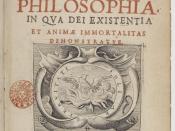René DescartesàMeditations is a discussion of metaphysics, or a critical look in discovering the truth about what one can be certain about. In these writings, he ultimately hopes to achieve with absolute certainty the nature of everything- including God, the physical world, and himself - the cogito. It is only with a clear and distinct knowledge of such things that he can then begin to understand his true reality. The inseparable question of GodÃÂs existence is whether life on earth exists, because of chance, through evolution, or because of the creation by a Supreme Being, higher power or infinite intelligence. Descartes says, ÃÂand by what path God may be known more easily and with greater certainty than the things of this worldà(Descartes 454). I believe that there is a definite source of our existence that can be known, that true existence of God.
These Meditations require open-mindedness and willingness in order to be able to understand or comprehend them.
ÃÂThey demand a mind that is quite free from prejudices and that can easily withdraw itself from association with the sensesÃÂ (Descartes 455). First of all, Descartes begins with freeing himself of all belief. He achieves this by withholding from all objects of his consciousness and the judgement that pronounces them true or false, thereby reducing them simply to representations.
In order to acquire absolute certainty, Descartes must first lay a complete foundation of integrity on which to build up his knowledge. To establish cogito, he first uses the technique he calls the ÃÂmethod of doubtÃÂ. Descartes believes that knowledge is in fact possible, through the suggestion that if we can doubt, then indeed we must think, therefore we must exist. He says, ÃÂI am, I existÃÂ is necessarily true every time I utter or conceive it in my...


